Dental Implants State College
State-of-the-Art Tooth Replacement

Whether you are missing one tooth or several, you’re probably well aware of the problems they can cause. Simple things like eating and speaking can become awkward and uncomfortable, plus missing teeth can make you very hesitant to smile, even among family and friends. For people in this situation, Centre Smiles is happy to provide the most state-of-the-art tooth replacement available today: dental implants. Compared to any other treatment, they provide the most durable, reliable, and beautiful results. To learn more about what dental implants in State College can do for you, contact us today.
Why Choose Centre Smiles for Dental Implants?
- Dental Implant Placement & Restoration Done In-House
- Experienced Dentist Who Uses the Latest Technology
- We Offer Additional Financing & Accept Insurance
What are Dental Implants?
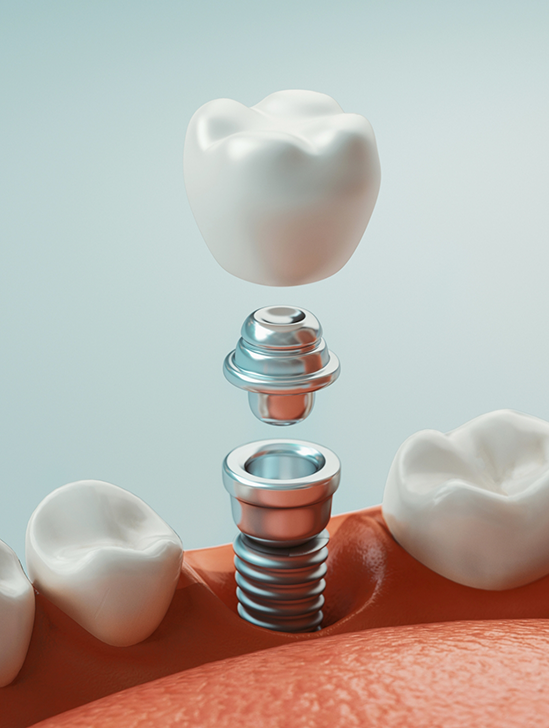
Dental implants are small posts that are surgically placed below the gumline and into the jawbone to restore the missing root structure of one or more teeth. They’re made from biocompatible materials like zirconia and titanium, allowing them to fuse with the jawbone through a natural process called osseointegration. As a result, they provide a stable foundation for any type of prosthetic to be attached to.
The 4 Step Dental Implant Process
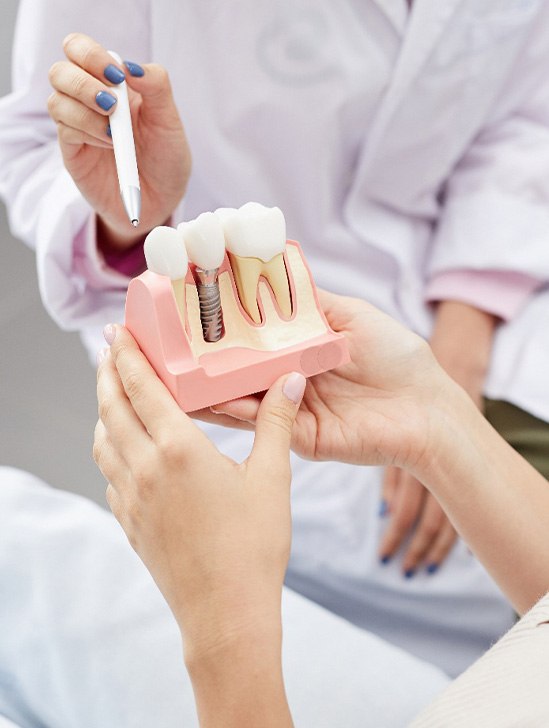
Traditional restorations like dental crowns and dentures can be planned and crafted over the course of a couple of appointments. But dental implants require a multi-step process that can last for several months. However, this should be seen as a positive, not a hindrance. Implants will stay with you for a lifetime with proper care, so it’s important to Dr. Starostik that your implant’s placement is successful and strong. Read more below to learn how dental implants work in State College, so you can be confident in your care.
Initial Dental Implant Consultation

Every dental implant starts with a detailed consultation. Dr. Starostik will review your medical and dental history, examine your gums and remaining teeth, and evaluate your bite.
Using advanced technology, like our cone beam scanner and digital impression system, he’ll also check your jawbone density and explain exactly how your treatment plan will work based on personalized information.
If you need preliminary treatments, such as extractions, gum disease treatment, or bone grafting, those will be discussed first. This visit is the most important step because it sets clear expectations for timelines, costs, and responsibilities, helping prevent any complications later in the process.
Dental Implant Surgery
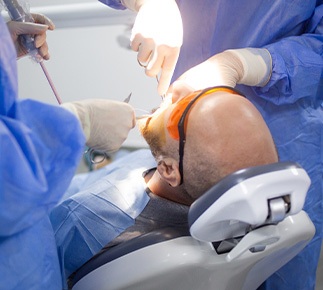
Once your plan is in place, you’ll return to our State College office for implant surgery at a later date. Dr. Starostik performs all dental implant surgeries in-house, saving you time and money when looking for a specialist.
After numbing the area with a local anesthetic and making sure you’re comfortable, he makes a small incision in your gums to access the jawbone. Next, carefully measured implant posts are placed into your jawbone at precise angles.
Once your implants are placed, your gums are gently closed around the posts, and small protective caps are placed over them to protect the area while you heal.
Dental Implant Osseointegration & Abutment Placement

Over the next several months (typically three to six), your jawbone will fuse with the implant posts in a process called osseointegration. During this time, you’ll need to rest and follow some basic post-op guidelines, like continuing your oral care routine, avoiding tobacco, and sticking to softer foods.
As you heal, you’ll come in for occasional checkups so our team can monitor your progress. Once the implants are firmly anchored, you’ll have a brief second procedure. At this visit, Dr. Starostik will uncover your posts and attach small connector pieces called abutments before allowing your gums to heal around them.
Delivery of Dental Implant Restorations

The final step is where everything comes together. Using your digital impressions, Dr. Starostik will have a trusted dental lab design custom crowns, bridges, or implant dentures that perfectly match your natural teeth. Once they arrive, these prosthetics are then securely attached to the abutments.
After a few final adjustments to your bite and comfort, you’ll be ready to leave the office with a complete, confident smile. From that moment on, you can enjoy all the benefits of your newly restored tooth, eating, speaking, and smiling with confidence.
Benefits of Dental Implants

With more than half a million dental implants placed each year, this life-changing treatment has quickly become one of the most popular ways to replace missing teeth. Thanks to their unique placement inside the jawbone, this modern tooth loss solution easily provides a wide range of important benefits you simply won’t get with options like dentures or dental bridges. In fact, dental implants have the potential to dramatically improve your confidence, health, and even your quality of life!
Day-to-Day Benefits

Dental implants offer so many benefits, especially ones you’ll notice immediately in your daily life. These include things like:
- The ability to chew all your favorite foods again.
- Easily brush and floss your teeth instead of needing to use expensive soaks or special cleansers.
- Smiling with confidence, knowing your new teeth look realistic and will never slip out of place at an embarrassing moment.
Health Benefits

In addition to the many wonderful daily benefits your new dental benefits can provide, they also offer some incredible health benefits, too. These include:
- Maintaining a strong, healthy jawbone.
- Supporting any surrounding teeth.
- Enabling you to eat a nutritious diet.
- Not causing gum sores or tooth sensitivity like dental bridges and dentures can.
- Easier cleaning means better oral health, and a lower risk of overall health issues.
Long-Term Benefits

Finally, your new dental benefits will also provide some little-known, long-term benefits, such as:
- A 95% success rate, even ten years after placement.
- No need to replace them every five to seven years like you would with dentures or dental bridges.
- A potential savings of both time and money when compared to other restoration options.
Who Dental Implants Can Help

Chosen by thousands of patients for their numerous benefits, dental implants are exceptionally popular, as they can effectively replace a single missing tooth, multiple teeth, or even an entire set of teeth. At your initial consultation, we'll determine your eligibility for dental implants in State College. Following our discussion, we’ll craft a customized treatment plan to address your specific needs. Click on the button below to learn more about this process!
Who is a Good Candidate for Dental Implants?
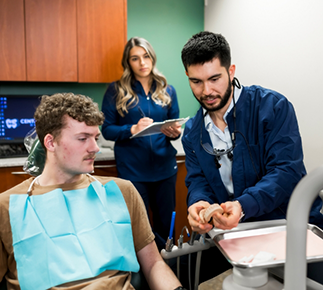
Dental implants are generally suitable for almost any healthy adult. To be considered a good candidate, you typically need:
- Good overall health - Since dental implant placement involves a minor procedure, it's important to be in good health to undergo the surgery successfully.
- Good oral health - Existing issues like gum disease or cavities can affect implant success, which is why they must be addressed before proceeding.
- Strong jawbone - Adequate jawbone density is important for supporting dental implants.
Even if you initially seem like you’re not a candidate for dental implants, we offer preparatory treatments like bone grafting and gum disease treatment to ensure implant success. After completing these procedures, your smile will be prepared for implants, and we'll design a plan tailored to the number of missing teeth.
Missing One Tooth
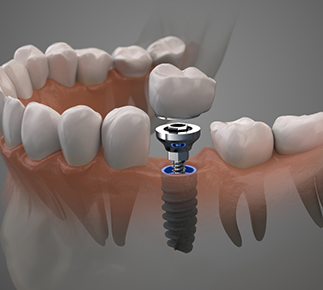
For just one missing tooth, we can place a single implant post, abutment (a metal connector piece), and a lifelike dental crown. Once this procedure is finished, your implant should be virtually indistinguishable from your natural teeth.
Missing Multiple Teeth
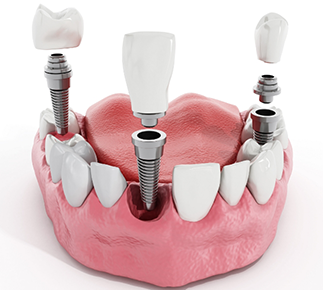
For those missing several teeth in a row, a few crowns can be strung together to form a sturdy dental bridge. An implant with a crown will be placed on either end of the space in your smile, and these will be bonded to prosthetic teeth to literally bridge the gap. Implant-retained bridges are not only much stronger than traditional ones, but they also do a better job of blending in with your smile.
Missing All Teeth
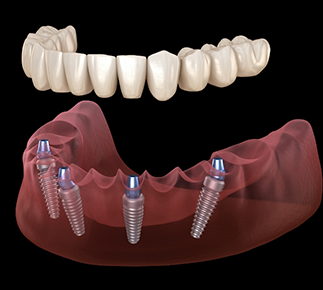
Instead of placing an implant for every missing tooth you have, we can simply place four to six in order to provide enough support for a full denture. This eliminates the need for ill-fitting dentures that slip around when talking or chewing. These prosthetic teeth are instead permanently fixed in your mouth, giving you a more consistent bite and smile.
Understanding the Cost of Dental Implants

The dental implant process needs to be personalized according to the needs of the patient. As such, there is no set price for the treatment; the overall cost can vary thanks to a number of factors. Rest assured, though, that a reliable estimate can be provided once your mouth has been thoroughly examined. If you read below, you’ll find a brief overview of some of the variables that can affect the cost of dental implants as well as options for making the procedure more affordable.
Preliminary Treatments & Dental Implant Surgery
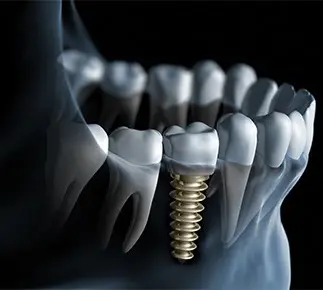
Before you receive your dental implants, you may need to undergo bone grafting or another type of preliminary treatment. Such procedures are often necessary to ensure that implant posts can successfully be placed. Needless to say, any preliminary work you need will come with its own costs.
As for the dental implant surgery itself, the price can be influenced by factors like the part of your mouth where the implant posts need to be inserted. Note that we can place dental implants in-office, so you won’t need to worry about receiving a bill from a different practice.
The Parts of Your Dental Implant
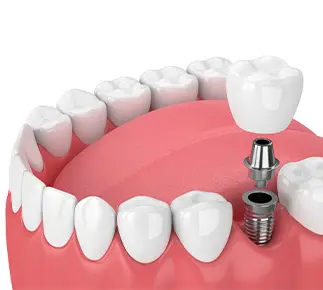
Determining the cost of the actual implant posts involves finding answers to the following questions:
- How many implant posts are needed? The number of teeth that you have lost can affect the number of implant posts that you end up paying for.
- What kind of restoration will you get? Dental implants can support crowns, bridges, and dentures, with the smaller types of restorations usually costing less.
- What brand of dental implant will be used? There are a number of implant manufacturers, and the overall cost is influenced by the brand you end up choosing.
How Dental Implants Can Save You Money

Dental implants have a higher initial cost than other tooth replacement options, so you may be surprised to learn that they can actually end up saving you money. This is thanks to their longevity; while you would need to pay to have a traditional bridge or denture replaced every 5 to 10 years, dental implants have the potential to last for decades. Additionally, you can take care of them as if they were real teeth, so you don’t have to worry about buying any specialized cleaning solutions.
Does My Dental Insurance Cover Dental Implants?

A lot of dental insurance plans do not include coverage for dental implant posts but can still help pay for the final restoration and related preliminary procedures. Of course, no two dental insurance plans are the same. It’s worth reaching out to your dental insurance provider in order to clarify what your coverage looks like.
Making Dental Implants Affordable

If you want to make the dental implant process less of a strain on your budget, you may want to consider pursuing financing through CareCredit. By allowing you to pay in monthly installments with little to no interest, CareCredit can make paying for your dental care much less stressful. You can also sign up for our Quality Dental Plan, which comes with member benefits on dental implants and various other services.
Dental Implant Post-Op Instructions

Now that you’ve had your dental implants surgically placed, it’s time for the recovery process. Thankfully, this is nothing to be worried about. Below, we’ll outline what you can expect, including which symptoms are normal and how you can best help your smile to heal. Should you ever experience any intense, abnormal pain or any other strange side-effects that aren’t mentioned here, please don’t hesitate to contact us as soon as possible for guidance.
What to Do Directly After Dental Implant Surgery

Immediately following your dental implant surgery, your biggest priority should be to leave the forming blood clot at the incision site or sites untouched so that your healing can happen smoothly. To do this, please be sure to follow these instructions:
- Never spit; instead, use tissues to wipe your mouth or swallow your saliva.
- Don’t use drinking straws.
- Don’t smoke or use tobacco products for at least the first day after surgery.
- Do your best to avoid touching the surgical site or sites with your fingers or tongue.
Common Side-Effects When Recovering from Dental Implant Placement

It is perfectly normal to experience some side-effects following dental implant placement, especially in the first few days after your procedure. These may include:
- Intermittent bleeding, which you can lessen by biting on gauze with light pressure. This may continue for several days.
- Swelling over the first 72 hours that could continue for over a week. You can apply cold or warm compresses to ease pain and reduce swelling.
- General discomfort can be treated with prescription or over-the-counter pain medication.
Any side-effects should be temporary and will gradually subside as time goes by. However, if that is ever not the case, please let us know as soon as possible.
Your Diet After Dental Implant Surgery

In the first few days following your surgical placement, we recommend eating a diet of softer, non-abrasive foods, including:
- Mashed potatoes
- Yogurt
- Ice cream
- Pudding
- Soup (not extremely hot)
- Scrambled eggs
- Pasta
- Hummus
You are free to return to a normal diet as soon as you feel up to it, but we recommend limiting anything overly crunchy or tough and avoiding any direct chewing on your dental implant site(s).
Post-Op Health & Oral Hygiene

The day after your dental implant surgery, it is okay to brush your teeth as usual but be very careful near your surgical site(s).
Rinse your mouth well with saltwater two or three times a day, ideally after eating. Be sure to use your prescription mouth rinse if you have it and avoid using any mouthwash that contains high levels of alcohol such as Listerine or Scope.
What to Do After Your New Teeth Are Attached

The great news is that the hardest part of your dental implant treatment is now behind you! When it’s time to get your new crown, bridge, or denture, you may experience some minor, temporary sensitivity in the gum tissue. Thankfully, this is easy to control with pain medication. You should not experience any swelling, bleeding, or extensive recovery at this stage. In fact, you should be ready to show off your brand-new smile that day!
Maintaining & Caring for Your Dental Implants

Maintaining and caring for your dental implants in State College will help them last longer so they can support your smile for years to come. A good routine will also help you avoid complications that could lead to needing repairs or replacements. Considering all it will take is about four minutes a day, dental implant maintenance is well worth the effort!
Make Oral Hygiene a Priority

Consistent oral hygiene is crucial for warding off gum disease and keeping your implant restoration white and bright. You can brush and floss your dental implants much like you would for natural teeth. Brush twice daily with a soft-bristled toothbrush for about two minutes each session, and floss once per day.
Eat a Healthy Diet

Sugar can be okay in small doses, but frequent consumption can jeopardize your dental implants by increasing your risk of gum disease. Carbohydrates should also be limited, as carbs quickly break down into sugar in your mouth. When you’re feeling hungry, reach for a raw vegetable instead. This snack encourages saliva production, which helps wash away harmful bacteria.
Break Bad Habits

It’s not always easy to break a bad habit. You might not even notice when you bite your nails for example, and smoking is notoriously difficult to quit. Sinking your teeth into hard objects like nails, keys, bottles, and packaging can lead to breakage though, while smoking is heavily associated with dental implant failure. Do your best to avoid these compulsions, and you’ll thank yourself for it later!
Protect Your Dental Implants
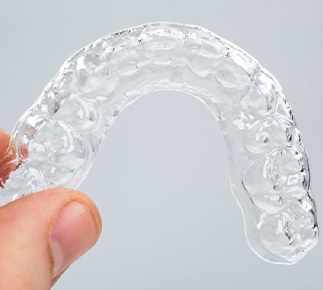
Hard impacts can do a number on your dental implant restoration. If you play a rough sport, make sure to wear a custom mouthguard to protect your smile from chips and cracks. If you grind or clench your teeth at night, ask your dentist for a nightguard that will lessen the strain on your teeth.
Schedule Regular Dental Checkups

Last but not least, remember to schedule regular dental checkups with your dentist in State College! This will enable us to help you monitor your oral health and the condition of your dental implants. If they look rather worn, we can repair them before the damage becomes more serious.
Dental Implant FAQs
Can I take dental implants out?
No, you can’t remove a dental implant because it replicates both the root and crown. A titanium post is surgically placed into the jaw to mimic a root. Your bone will fuse to the implant through a process called osseointegration, allowing it to stay in place forever with the right care. Although some implant dentures are removable for easy cleaning, only a trained dental professional can remove posts, such as in cases of dental implant failure.
How long do dental implants last?
Dental implants provide predictable results. They are proven to last for 30 years or more with the right maintenance. Various factors affect the lifespan of the prosthetic, like the location. The back teeth experience more pressure from chewing, so they may have a slightly shorter life expectancy. You can safeguard your investment by limiting hard or sticky foods. Your oral hygiene habits are essential to promoting the long-term success of your new smile. Besides brushing and flossing, visit your dentist every 6 months for a cleaning and checkup. Your implant dentist in State College will recommend avoiding anything that may lead to complications, like smoking, chewing on your fingernails, or using your teeth to open packages.
What are the signs of dental implant failure?
The risk of dental implant failure is less than 5%, but it’s important to remain vigilant for any signs of complications, like pain, swelling, or redness near the post. Do not wait to see a dentist if you develop any concerning symptoms because they can be caused by an infection, called periimplantitis. Your dentist can provide the quick care you need to preserve your smile.
What should I do if my dental implant feels loose?
After your jawbone has fused to the implant, it should never feel loose. If your dental implant wiggles, you need to see a dentist right away. While it could be caused by a loose restoration, the instability can also be the result of bone loss or infection. Your dentist will identify the problem to restore a healthy, functional smile.
Am I too old to get dental implants?
There isn’t an age limit for dental implants; however, older patients often have certain health issues or take medications that may complicate the surgery or recovery process. Pre-existing medical conditions don’t disqualify you from undergoing the procedure. Your dentist will perform a thorough consultation to ensure your treatment’s success. They will create the personalized treatment plan you need to safely and effectively replace your missing teeth. It isn’t uncommon to need a little prep work, like gum disease therapy or bone grafting. Although it may add additional steps to the treatment process, they are necessary to ensure your new smile thrives.
